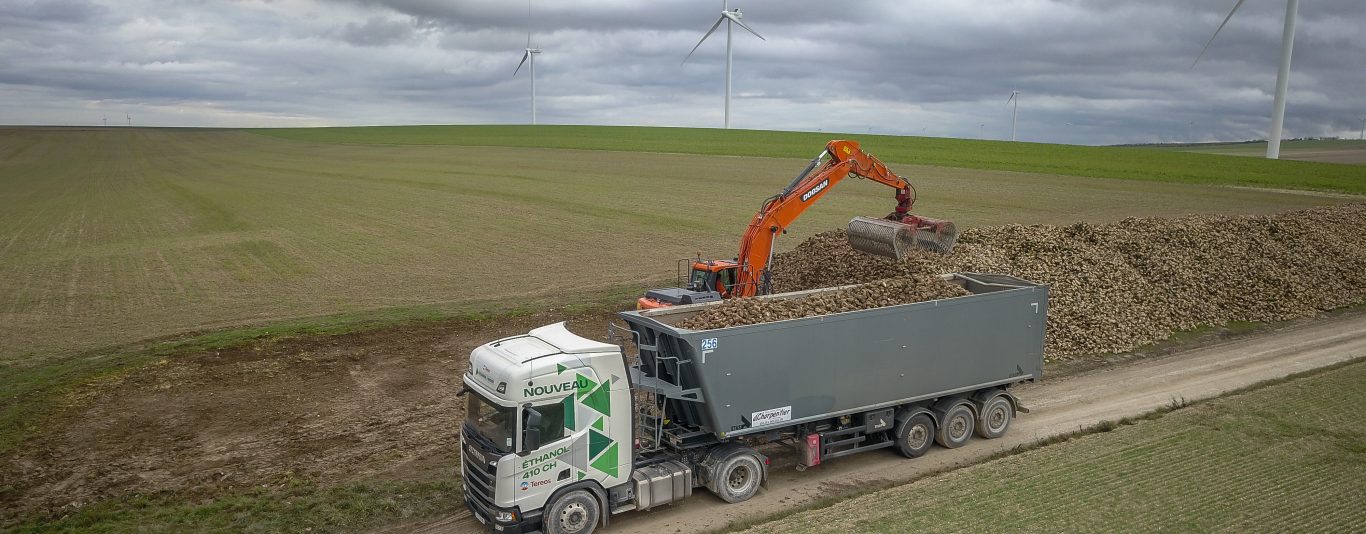News
A truck that “runs on sugar beet”

Tereos has tested a solution that is local, sustainable, and will provide jobs across its French sites. Welcome aboard!
This is a real “first”. At Tereos, a truck that runs exclusively on bioethanol ED95 [1] is being used to transport sugar beets harvested close to sites operated by Tereos Sugar France. ED95 contains around 95% ethanol and 5% additives and is produced from the waste resulting from the processing of sugar beets into sugar: “It is a truck that uses sugar beet waste to transport sugar beet!” explains Valérie Corre, Director, Regulatory Affairs Alcohol/Ethanol at Tereos. “This is a prototype loaned to us by the Swedish manufacturer Scania, our strategic partner in this field since 2015. During the last beet campaign, our carriers were given the chance to test-drive the truck. This approach is fully in line with the notion of a circular economy on which Tereos’ model is based. This enables Tereos to reduce its environmental impact and make full use of the raw materials.”
Eager to constantly find new markets for its products and thus fully optimize the value of sugar beet, the Group has been committed to the development and promotion of ED95 in France for several years. Bioethanol is a local energy that supports food production in our regions and boosts agricultural income by diversifying market opportunities. It is also a renewable energy that helps to reduce well-to-wheels CO2 emissions (taking into account emissions from fuel production and the exhaust system) by 86% compared to diesel in urban areas (according to an ADEME study: see box below). “ED95 fully replaces diesel in coaches, buses, and trucks equipped with specific engines developed by Scania. It represents a source of additional value creation that supports growers’ income, which has been adversely affected by the end of sugar quotas,” adds Valérie Corre.
Convincing pilots
Tereos is the first global manufacturer to operate a truck that runs on waste from transforming French sugar beets into sugar. Several local carriers are currently testing this vehicle, which should pave the way for transitions to ED95.
It is a tangible project that supports the long-term promotional work carried out with the French authorities. “Since the event organized by Tereos in 2015 with Scania and the Paris City Hall during COP21 to showcase an ED95 bus, we have carried out extensive work regarding tax considerations, with the support of the customs authorities. The objective is for ED95 to be recognized as a biofuel (it has been authorized in France since February 2016), occupy its rightful place in the energy mix, and be integrated into the French tax system”, explains Valérie Corre.
Finally, France had some good news recently: “In line with EU law, Mr. de Rugy, French Minister of Ecology, has recognized that bioethanol produced from the waste of sugar factories and starch facilities is an uncapped biofuel. This makes it possible not only to increase the bioethanol incorporation targets but also to acknowledge the importance of the environmental potential of waste-derived bioethanol for greener transportation.”
Addressing the entire chain: biofuel, technology, and distribution
In order to make transportation more environmentally friendly, we must take three lines of approach: decarbonize fuel, adapt technologies, and finally develop distribution networks. Tereos is currently working with the competent authorities and Houtch, a carrier based in Saint Quentin. For more than a year, Houtch has been using an ED95 truck supplied by Tereos. Eventually, the Houtch gas station could distribute ED95 to the captive fleet in the region.
Tereos is therefore maintaining its commitment to an alternative to fossil fuels that has multiple environmental, economic, and societal advantages. While transportation emissions (which represent almost a quarter of the total emissions in the EU) continue to increase in France and the EU, bioethanol in all its forms (E10, E85, and ED95), in addition to other renewable alternatives, has a major role to play. Bioethanol has a threefold advantage: responding immediately to the issue of climate change but also to that of costly energy dependence, which is putting increasing pressure on household budgets, while also supporting the growers’ income and thereby boosting agricultural activity in France.
| A clean fuel
ADEME (the French environment and energy management agency) and Scania measured emissions for three coaches running on diesel (Euro 6 standard), ED95, and natural gas, respectively. Each vehicle drove 800 km in real conditions in different environments: in an urban area (45%), on the road (25%), and on the highway (30%). Out of the emissions produced by well-to-wheels CO2, emissions from ED95 are significantly lower than those for diesel, natural gas for vehicles, and even biogas!
Well-to-wheels CO2 emissions
|
| Did you know?
To ensure greater clarity with regard to fuel labels, a European directive was published in October 2018. Fuel labels are now more complete thanks to an additional label implemented at all gas stations in member countries of the European Union. The result? A sustainability indicator symbol is displayed alongside existing product names. Today at the fuel pump:
|
